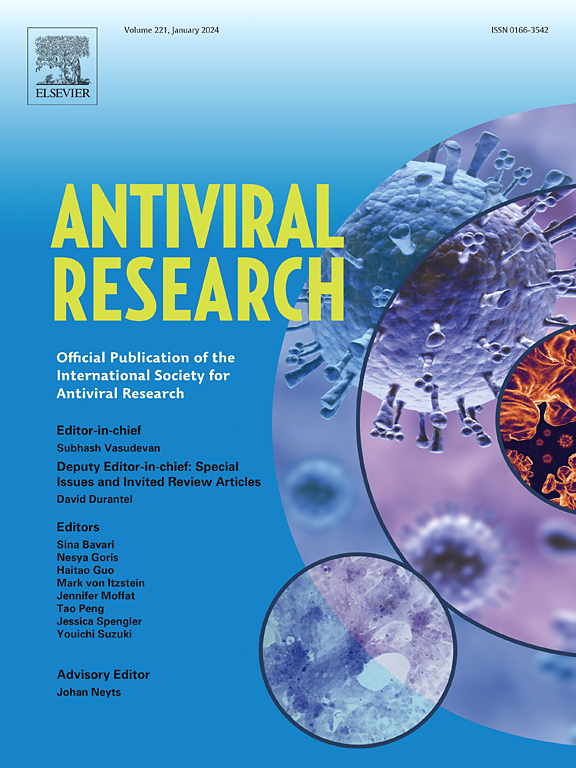猪流行性腹泻病毒的抗病毒作用。
IF 4.5
2区 医学
Q1 PHARMACOLOGY & PHARMACY
引用次数: 0
摘要
猪流行性腹泻(PED)是由猪流行性腹泻病毒(PEDV)引起的仔猪致命传染病,长期以来,全球养猪业受到周期性暴发的严重影响。目前,现有的疫苗和抗病毒药物还不能有效预防和治疗猪PEDV感染。在本研究中,圆形圆叶草(B. rotunda)提取物及其主要生物活性类黄酮pinostrobin具有显著的抗pedv活性,其EC50值分别为0.33±0.02 μg/ml和2.71±0.12 μM,选择性指数(SI)分别为11.93和bb0 184.55。基于添加时间测定的结果显示,pinostrobin主要在感染的早期阶段阻断PEDV感染。更具体地说,pinostrobin减少了由病毒刺突蛋白介导的细胞-细胞融合,表明该化合物可能靶向病毒融合步骤。我们还合成了pinostrobin衍生物,并探讨了pinostrobin结构特征对观察到的抗pedv活性的影响。结果表明苯基环上羟基和取代基的重要性。综上所述,本研究强调了圆圆b提取物及其生物活性化合物pinostrobin作为开发抗病毒药物的候选物的潜力,以更有效地控制PEDV感染。本文章由计算机程序翻译,如有差异,请以英文原文为准。

Antiviral effect of pinostrobin, a bioactive constituent of Boesenbergia rotunda, against porcine epidemic diarrhea virus
Global swine industry has long been severely affected by the periodic outbreaks of porcine epidemic diarrhea (PED), a deadly infectious disease in piglets caused by the porcine epidemic diarrhea virus (PEDV). Currently, available vaccines and antiviral drugs could not provide effective prevention and treatment of PEDV infection in pigs. In this study, Boesenbergia rotunda (B. rotunda) extract and its major bioactive flavonoid, pinostrobin, were demonstrated to exhibit remarkable anti-PEDV activities with EC50 values of 0.33 ± 0.02 μg/ml and 2.71 ± 0.12 μM, and selectivity indices (SI) of 11.93 and > 184.55, respectively. Results based on a time-of-addition assay showed that pinostrobin blocked PEDV infection mainly at the early stages of infection. More specifically, pinostrobin reduced cell-cell fusion mediated by the viral spike protein, suggesting that the compound may target the virus fusion step. We also synthesized pinostrobin derivatives and explored the impact of pinostrobin structural features to the observed anti-PEDV activity. Results indicated the importance of the hydroxyl group and substituent on the phenyl ring. In summary, this study highlights the potential of B. rotunda extract and its bioactive compound, pinostrobin, as candidates for the development of antiviral drugs to more effectively control PEDV infection.
求助全文
通过发布文献求助,成功后即可免费获取论文全文。
去求助
来源期刊

Antiviral research
医学-病毒学
CiteScore
17.10
自引率
3.90%
发文量
157
审稿时长
34 days
期刊介绍:
Antiviral Research is a journal that focuses on various aspects of controlling viral infections in both humans and animals. It is a platform for publishing research reports, short communications, review articles, and commentaries. The journal covers a wide range of topics including antiviral drugs, antibodies, and host-response modifiers. These topics encompass their synthesis, in vitro and in vivo testing, as well as mechanisms of action. Additionally, the journal also publishes studies on the development of new or improved vaccines against viral infections in humans. It delves into assessing the safety of drugs and vaccines, tracking the evolution of drug or vaccine-resistant viruses, and developing effective countermeasures. Another area of interest includes the identification and validation of new drug targets. The journal further explores laboratory animal models of viral diseases, investigates the pathogenesis of viral diseases, and examines the mechanisms by which viruses avoid host immune responses.
 求助内容:
求助内容: 应助结果提醒方式:
应助结果提醒方式:


